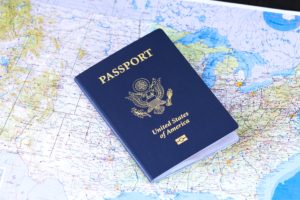Summer is the prime travel season. From staycations and road trips to Caribbean getaways and cruises, summertime offers the chance to escape and unwind with a much-needed (and well-deserved) vacation. Wherever you spend your vacation, you want to enjoy every minute. Getting sick is never on someone’s bucket list. That’s why we encourage you to check in with your primary care provider before you go. There are greater reasons for caution in some locations rather than others but preparation and precaution are what you need to do before you get on the plane, boat or train.
Research your destination – know before you go
There are lots of things you need to know about the place you’re going. Do they have a health warning or advisory? Are there required vaccinations? How long in advance do you have to get them. The US State Department has some useful information on these and other issues at https://wwwnc.cdc.gov/travel/destinations/list/
Check your tour or cruise company, or the tourism board of the country or place you are visiting, they will also offer useful, on the-spot information. Key concerns are whether malaria, Zika, Ebola and other serious diseases are present. If you have a disability, or a health condition, or a compromised immune system, if you’re traveling with children, if you’re pregnant, or have allergies, don’t leave home without talking to your doctor.
If you suspect that an existing condition might flare up, carry a letter from your doctor with a summary of your diagnosis and treatments. Don’t leave home without a plan, and when in doubt over plan! You’ll be very glad you did.
Pack your meds
The absolute worst time to find you don’t have your medication for allergies, blood pressure, etc. is any time after you’ve left home. Plan for the number of days you’ll be away, then add some more for unavoidable delays. A few years ago, air travelers from all over the world were grounded due to the Icelandic volcano interruption. Having extra meds for another 10 days is the wise choice. These reminders can be helpful:
- If your prescriptions are likely to expire, consult your doctor well in advance to make sure you have enough.
- If you have both checked luggage and carry-on, put some medication in both so you’ll have what you need in case you are temporarily separated from your luggage.
- Bring your medications in their labeled containers, not in a pill pack. You may need to renew or replace them or show them to customs inspectors.
- Rescue medicines such as EpiPens, inhalers, glasses, contacts, medical equipment (CPAP device), insulin and diabetes testing supplies
Get your vaccines
Pro travel tip: don’t get your vaccines close to your travel date as some shots cause a minor reaction. However, you must get the right vaccinations for your destination. Otherwise you may not be admitted to the country. This means you must have a certificate proving you’ve had your vaccinations. This is a list from the Center for Disease Control of destinations around the world and what vaccinations and other health precautions that are advised: https://wwwnc.cdc.gov/travel/destinations/list/
Keep healthy when you arrive
It’s a fact that people often get sick on vacation. Here’s what can happen and how to avoid it.
- Keep germs at bay. When you travel you come into contact with lots of people and germs to which you may not have immunity. Protect yourself with frequent hand washing and hand sanitizer.
- Get some rest. Experts suggest that a good night’s sleep is a great boost for your immune system. When you’re exhausted and stressed, your system is more vulnerable to illness.
- Eat healthy food and clean water. When possible, choose plenty of veggies and fruits, be thoughtful with street food. Give your immune system an even break. Drink bottled water. Be careful that ice is made with bottled water. If you know that your destination has water problems, carry water purification tablets. It is important to stay hydrated.
Travel insurance or travel medical insurance?
- Travel Insurance insures your financial investment in your trip. Typically it covers such things as the cost of lost baggage and canceled flights, but it may or may not cover costs of medical attention you may need while abroad.
- Travel Medical Insurance covers costs of medical attention you may need while abroad.
- Travel Medical Insurance may cover your treatment but it probably won’t cover flying you home. Check the terms carefully and carry the policy information with you.
The basics to keep you safe
The Center for Disease Control recommends the following supplies. The list may seem long but these will pack up small and could save your life, the day or your vacation.
Over-the-counter medicines
- Diarrhea medicine (Imodium or Pepto-Bismol)
- Antacid
- Antihistamine
- Motion sickness medicine
- Cough drops, cough suppressant, or expectorant
- Decongestant
- Pain and fever medicine (acetaminophen, aspirin, or ibuprofen)
- Mild laxative
- Mild sedative or sleep aid
Supplies to prevent illness or injury
- Hand sanitizer (containing at least 60% alcohol) or antibacterial hand wipes
- Water purification tablets
- Insect repellent (with an active ingredient like DEET or picaridin)
- Sunscreen (with UVA and UVB protection, SPF 15 or higher)
- Sunglasses and hat
- Condoms
- Earplugs
First-aid kit
- 1% hydrocortisone cream
- Antibacterial or anti-fungal ointments
- Digital thermometer
- Oral rehydration salts
- Antiseptic wound cleaner
- Aloe gel for sunburns
- Insect bite anti-itch gel or cream
- Bandages
- Disposable gloves
- Cotton swabs (Q-Tips)
- Tweezers
- Eye drops
Speak with your primary care physician or specialist about your travel plans and any special considerations related to your health. He or she can offer guidance on any restrictions or precautions you should keep in mind. And most importantly, have a wonderful time!


